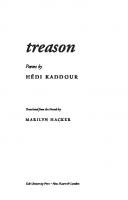Two Theological Poems Probably Composed by Alan of Lille
135 85 2MB
English Pages [15] Year 1976
Recommend Papers

- Author / Uploaded
- Nikolaus M. Häring
File loading please wait...
Citation preview
PRE
ANALECTA CISTERCIENSIA PERIODICUM SEMESTRE
B-342
SUMMARIUM B. W. O'DWYER , The Crisis in the Cistercian Monasteries in Ireland in the Early Thirteenth Century ( )
3
The Book of Experience : Alan of Lille's Use of the Classical Rhetorical Topos in his Pastoral Writings
113
II
G. R. EVANS ,
Croissance et adaptation chez les Cisterciens au treizième siècle Les débuts du Collège des Bernardins de Paris
P. DAUTREY ,
. 122
N. HÄRING , Alan of Lille's De Fide Catholica or Contra Haereticos N. HÄRING , Two Theological Poems Probably Composed by Alan of Lille . L. J. LEKAI, Medieval Cistercians and their Social Environment . The Case of
216 238
Hungary
251
Recensiones
281
Index Generalis Voluminum
ANNUS XXXII
21-32
289
( 1965-1976 )
FASC . 1-2-
- 1976 NOSTR MATER CISTERCIM
The
University
of Michigan Periodical
EDITIONES CISTERCIENSES ( 1-00153 ) ROMA , PIAZZA DEL TEMPIO DI DIANA ,
JAN .- DEC .
14
FEB
Reading
81978
Room
ANALECTA CISTERCIENSIA
ANNUS XXXII
1
1976
NOSTA MATER STERCNM
EDITIONES CISTERCIENSES ( I -00153 ) ROMA , PIAZZA DEL TEMPIO DI DIANA ,
14
TWO THEOLOGICAL POEMS PROBABLY COMPOSED BY ALAN OF LILLE NIKOLAUS
M.
HÄRING , S.A.C.
One of the oldest and best manuscripts containing Alan's De planctu nature is MS London , B. M. Stowe 37 ( f . 1-34v ) , written ca. 1200 in Northern France ' . Added to the original manuscript are two folios ( . 35-36 ) copied by a different scribe at a slightly later date . The addition comprises two poems not listed in the Initia carminum of H. Walther 2, and apparently not preserved in any other manuscript .
f
The first of these poems consists of 187 verses and begins with « Declarare fidem , quis ait , uos detrahit error ? » It concludes a question :






![Tale without a Hero and Twenty-Two Poems by Anna Axmatova [Reprint 2020 ed.]
9783112318379, 9783112307212](https://ebin.pub/img/200x200/tale-without-a-hero-and-twenty-two-poems-by-anna-axmatova-reprint-2020nbsped-9783112318379-9783112307212.jpg)


